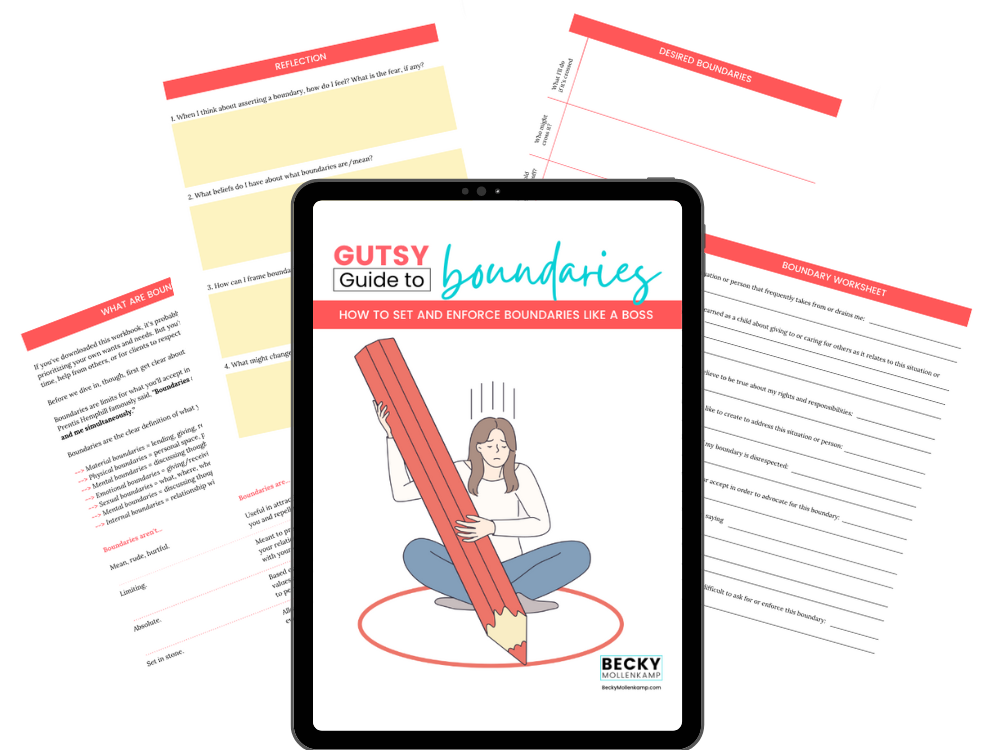How to Overcome Fear of Confrontation
If you learned that conflict is bad, then you likely avoid it at all costs. Learn why confrontation can be healthy, and get 5 tips for becoming more comfortable with it.
By Becky Mollenkamp, PCC
My fear of confrontation came at a steep price.
I avoided difficult conversations—and any conversation that I wasn’t certain would be easy and positive felt like confrontation or conflict.
That led to me accepting less than I deserved in personal and professional relationships. I didn’t express my needs for fear of it leading to conflict.
Instead of asking for what I wanted, I expected people to read my mind and intuitively expect and meet my needs. That didn’t happen, of course, so I stewed and grew resentful.
Sometimes, I’d make vague or passive-aggressive demands and expect people to understand what I meant or infer how important something was to me. They didn’t, so again I grew resentful.
I didn’t discuss my resentment because, again, I feared that difficult conversation. Instead, I mentally checked out and eventually walked away (like suddenly quitting a job or moving to another state). Or, I did something to force the other party to walk away.
And I left most situations feeling righteous indignation. They should have known I was unhappy, they didn’t do anything about it, so it was really their fault.
That sounds bad, and it was a bad way to live. Thankfully, over the last decade, I’ve done a lot of work to overcome that fear.
What causes fear of confrontation?
Even so, the fear of confrontation is so deeply rooted that it still takes conscious effort to manage. Every time I need to have a tough conversation, I still feel the pull to avoid it.
There are many factors that can cause a fear of confrontation.
• Societal conditioning, especially about what it means to be a “good girl” (ie, people pleasing).
• A tumultuous or violent childhood.
• Never learning how to have healthy confrontation.
• Negative experiences around conflict in the past (including being bullied).
• Low self-esteem, which diminishes confidence.
• Being an introvert who feels drained by interacting with others.
Most often, several of these (or other) reasons contribute to a fear of confrontation. Whatever the causes, fear of confrontation often looks like dreading the discomfort that it causes.
• Physical discomfort = sweating, a pit in the stomach, tight shoulders, a clenched jaw, etc.
• Emotional discomfort = fear of being judged, rejected, of hurting someone, or that the other party will confirm your deepest fears (you’re bad, unlovable, unworthy).
Who wouldn’t want to avoid that sort of physical and emotional pain?

GUTSY GUIDE TO BOUNDARIES
SCARED TO ADVOCATE FOR YOUR NEEDS?
This PDF is packed with practical, proven worksheets to help you set and enforce boundaries (and overcome your fear of confrontation).
How to Overcome Fear of Confrontation
It may feel easier to avoid confrontation, but it is typically only a temporary relief that comes with long-term costs. Every small confrontation can add up to damaging resentment and diminished self-esteem over time.
If you’re ready to challenge yourself to engage in, rather than avoid, difficult conversations that are needed, here are 5 tips to help you overcome the fear of confrontation.
1. Reframe what confrontation means.
If you’re afraid of confrontation then there’s a good chance that, like me, you view it as something negative. You may think of it is as fighting or being rude.
Recognize that these beliefs aren’t true and they aren’t yours. They were given to you, probably by family and society, because they serve to protect the status quo.
If people—especially those with marginalized identities—are afraid of asserting and advocating for themselves, then they won’t demand changes that would disrupt or destroy the systems that preserve white male privilege.
In the case of interpersonal relationships, one person avoiding conflict may serve another person who benefits from never being challenged.
You’re allowed and empowered to choose a new way of viewing confrontation.
You can see it for what it is—healthy, helpful communication that is the most important for of self-advocacy.
If you want some help in this process of changing your story about confrontation, grab my free Reframing Beliefs worksheet.
2. Understand the fundamentals of healthy confrontation
Many of us are not taught nor shown how to have a productive yet difficult conversation. We may fall into unhelpful habits that we learned early in life, but the truth is it is entirely possible to be assertive and kind at the same time.
• Whenever possible, have difficult conversations face to face. Non-verbal communication is lost via text or social media. It may feel more uncomfortable to engage in person, but it drastically reduces the risk of escalation due to misinterpretation. Also, people tend to feel more empathy for a person who’s directly in front of them.
• Be respectful. You don’t have to yell or raise your voice to get your point across. It’s not helpful to make accusations, be sarcastic or condescending, call names, or curse. Be mindful of how your words and tone may be perceived.
• Be clear. People who fear confrontation tend to sugarcoat or downplay what they really mean to sound nicer. But that can leave the other party confused and frustrated. As Bréne Brown says, being clear is kind and being unclear is unkind. Say exactly what you mean so the other person cannot misunderstand.
• Stick to “I” rather than “you” statements. Instead of “you did this and you’re a jerk,” try something like, “when this happens, I feel like this.” Accusing and blaming others puts them on the defensive. Expressing how something makes you feel fosters empathy.
• Don’t do all the talking. Give space for the other person to actively participate in the conversation, and truly hear them out (rather than formulating what you’ll say next). It’s also helpful to reflect back what you heard them say so they can clarify any misunderstandings.
3. You’re only responsible for yourself
If you’ve been made to believe that you can make another person feel a certain way (or that other people can make you feel good or bad), then this may be difficult to internalize.
The truth is, you can’t control how others think, feel, or act. If you do your best to have a healthy, productive, kind, and clear conversation, it’s not your responsibility how the other party receives it.
In fact, every conversation or relationship is a 50-50 experience, and you can only control your half.
Others who also fear confrontation may not respond well to uncomfortable conversations, but their reactions are their own responsibility. Your fear of confrontation is yours to overcome, and theirs is theirs.
Release yourself from the faulty notion that you could hurt someone simply by advocating for yourself with a healthy conversation.
4. Remember your why
If someone does make you feel badly for asserting a boundary or otherwise advocating for yourself, focus on the reason you chose to engage in the confrontation in the first place.
Think about why this conversation was needed and why it was important to you. It is not only okay to advocate for yourself or someone else or something you believe in, it’s important. It’s part of what makes you you.
When you act in alignment with your values, then what you do is valuable—even if someone else doesn’t understand or doesn’t respond well.
Standing up for yourself or others doesn’t make you bad. If someone else doesn’t agree, that’s on them. Don’t lose yourself or act against your own values just to avoid confrontation.
Use your why as fuel for staying engaged and not giving up when confrontation feels difficult.
5. Start small, and do all things with safety
If you’ve always avoided confrontation, it will be challenging to start engaging in difficult conversations. Create safety by taking baby steps toward more challenging conversations.
Build your skills through practice; pick the right person at the right time with the right issue. Don’t start with the biggest, scariest conversation with someone who you are pretty sure will react negatively. Instead, start by having a slightly difficult talk with someone you know loves you unconditionally.
The more baby steps you take, the more you will learn and BELIEVE that confrontation doesn’t have to be disastrous and that it can, in fact, be positive. You’ll learn that you can be uncomfortable, and still be safe.
I hope these tips help. I recognize that it’s not easy to go from a fear of confrontation to being the kind of person who frequently and easily engages in difficult conversations.
It will take time, but practicing these 5 tips will slowly change how you feel about confrontation so you can better advocate for yourself and what’s important to you.



